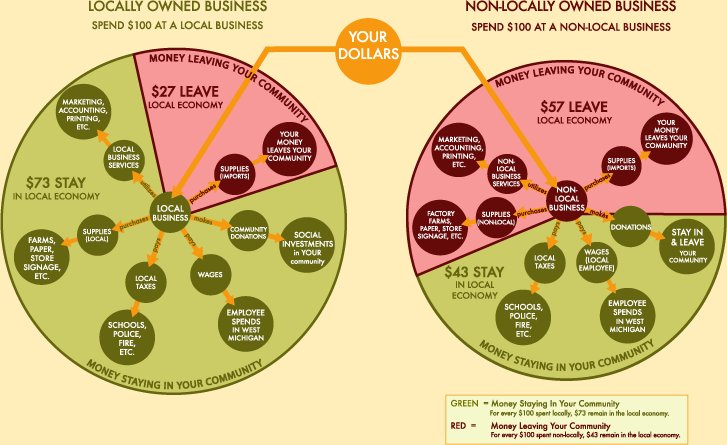“A dollar will be spent once or twice in Black and immigrant communities, but will be spent as many as 7 or 8 times in predominantly white communities. It’s called the velocity of money.”
Local businesses return 80% of each dollar to your community: which creates jobs, which creates our middle class.
“The Chains That Bind” via Sylvia Wyant, from the Spring 2006 issue.
Shopping local and independent sounds nice, but we Americans like to save a buck. We like convenience. And, judging from the proliferation of big box chains, we like consistency.
So why go out of our way to ‘shop-local-first’? It goes like this: when you spend your dollars at an independent, local business, you keep more money in your hometown—supporting your community’s social services, schools, your public library and local non-profits. How so? Locally-owned businesses return about 80% of each dollar to their community. And each dollar spent at a local business will return up to five times that amount within your community through city taxes, employees’ wages, and purchases of materials, supplies and services at other independent businesses.
Chains and franchises, on the other hand, contribute roughly 40%, and as little as 20% of sales back to your community. And many big boxes, such as Walmart or Home Depot, are given tax-incentives by local governments—costing you far more than the discounted price you think you’re paying.
Ever wonder why you can’t find a particular local, independent publication in the national bookstores? Well, most national chains like the look of “sameness” from one store to the next. They can’t have their ear to the ground and their roots in the community, in the same way as mom n’pop shops. So the choice is made not to place these different, local publications in their stores [this applies even to ‘good’ chains, such as Whole Foods or Wild Oats].
Why does this matter? Independent, local publications are the backbone of a healthy democracy. This is particularly important when a big national company whose main goal is to serve its shareholders owns the “local” newspaper.
When you make your purchases at independent, businesses you’re supporting people and services in your community, not corporations that all-toooften (but not always, thankfully) exploit natural resources and people for the good of the bottomline and their shareholders.
Now, most of us make purchases at a national store of some sort. But if we just make most of our purchases from businesses that are local, if we make the conscious decision to support our own community, more good things will happen to the town where we live. And where we live is pretty important.
Why? I like where I live. It has a character and a uniqueness that tourists swarm to because guess what? They come here for the unique, independent businesses—not the conventional stores they could find in any indoor mall. The storefronts are unique, the coffee shops are different, and the merchandise is as varied as the locals who own and stock them. Independent businesses house independent minds that make different choices based on their creative, ear-to-the-ground mindset. And it is these choices that make a community interesting, diverse and attractive.
Sylvia L. Wyantis Executive Director of the Boulder Independent Business Alliance—and a writer, professor, artist and psychotherapist!

 Share on bsky
Share on bsky







Read 20 comments and reply